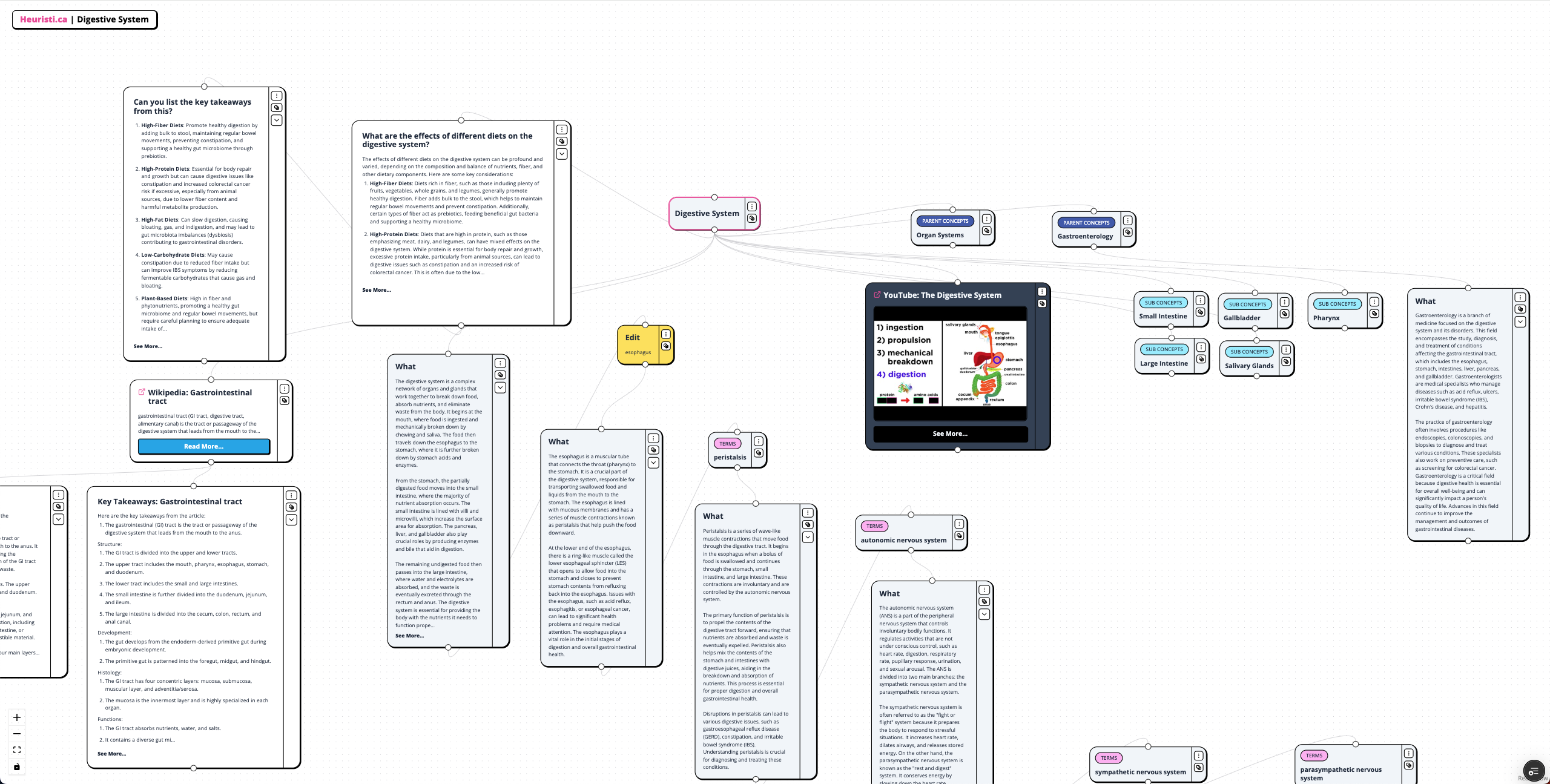Digestive System Concept Map

Summary
The digestive system is a complex network of organs and glands that work together to break down food, absorb nutrients, and eliminate waste from the body. It begins at the mouth, where food is ingested and mechanically broken down by chewing and saliva. The food then travels down the esophagus to the stomach, where it is further broken down by stomach acids and enzymes.
From the stomach, the partially digested food moves into the small intestine, where the majority of nutrient absorption occurs. The small intestine is lined with villi and microvilli, which increase the surface area for absorption. The pancreas, liver, and gallbladder also play crucial roles by producing enzymes and bile that aid in digestion. The remaining undigested food then passes into the large intestine, where water and electrolytes are absorbed, and the waste is eventually excreted through the rectum and anus.
The esophagus is a muscular tube that connects the throat to the stomach and is responsible for transporting swallowed food and liquids. It is lined with mucous membranes and uses peristalsis, a series of muscle contractions, to push food downward. The lower esophageal sphincter prevents reflux of stomach contents back into the esophagus.
Peristalsis is essential for moving food through the digestive tract, beginning in the esophagus and continuing through the stomach and intestines. It is controlled by the autonomic nervous system, which regulates involuntary bodily functions, including digestion.
The autonomic nervous system consists of the sympathetic and parasympathetic nervous systems. The sympathetic nervous system prepares the body for stress responses, while the parasympathetic nervous system promotes rest and digestion, ensuring energy conservation and recovery.
Homeostasis is the process by which biological systems maintain a stable internal environment. It regulates factors such as temperature and glucose levels, ensuring optimal functioning despite external changes. For example, the body maintains temperature through mechanisms like sweating and shivering.
Gastroenterology is the medical field focused on the digestive system and its disorders, encompassing the study and treatment of conditions affecting the gastrointestinal tract. Gastroenterologists perform procedures like endoscopies and colonoscopies to diagnose and manage diseases.
The effects of different diets on the digestive system can vary significantly. High-fiber diets promote healthy digestion, while high-protein and high-fat diets can lead to digestive issues. Plant-based diets are beneficial for gut health, whereas processed food diets can negatively impact digestion. Adequate hydration is crucial for maintaining digestive health.
Key Takeaways
- The digestive system is a complex network of organs and glands that breaks down food, absorbs nutrients, and eliminates waste.
- Digestion begins in the mouth and continues through the esophagus, stomach, small intestine, and large intestine.
- The small intestine is where most nutrient absorption occurs, aided by structures like villi and microvilli.
- The pancreas, liver, and gallbladder produce enzymes and bile that assist in digestion.
- The esophagus connects the throat to the stomach and uses peristalsis to transport food.
- Peristalsis is a series of involuntary muscle contractions that move food through the digestive tract.
- The autonomic nervous system regulates involuntary bodily functions, including digestion.
- The sympathetic nervous system prepares the body for stress, while the parasympathetic nervous system promotes rest and digestion.
- Homeostasis maintains a stable internal environment, crucial for survival and proper functioning.
- The gastrointestinal (GI) tract is divided into upper and lower tracts, each with specific organs and functions.
- Gastroenterology focuses on the digestive system and its disorders, involving diagnosis and treatment of various conditions.
- Different diets can significantly impact digestive health, with high-fiber diets generally promoting better digestion.
- High-protein and high-fat diets can lead to digestive issues if not balanced with fiber intake.
- Processed food diets are linked to increased inflammation and gastrointestinal disorders.
- Adequate hydration is essential for healthy digestion and nutrient absorption.
Additional Concepts
Questions and Answers
What is the digestive system?
What is the function of the esophagus?
What is peristalsis?
What is the autonomic nervous system?
What role does norepinephrine play in the body?
What is homeostasis?
How do different diets affect the digestive system?
Flashcards
What is the digestive system?
The digestive system is a complex network of organs and glands that work together to break down food, absorb nutrients, and eliminate waste from the body.
What role does the esophagus play in digestion?
The esophagus is a muscular tube that connects the throat to the stomach, responsible for transporting swallowed food and liquids through peristalsis.
What is peristalsis?
Peristalsis is a series of wave-like muscle contractions that move food through the digestive tract, beginning in the esophagus and continuing through the intestines.
What is the autonomic nervous system?
The autonomic nervous system (ANS) controls involuntary bodily functions, regulating activities such as digestion, heart rate, and respiratory rate.
What is the function of the sympathetic nervous system?
The sympathetic nervous system prepares the body for 'fight or flight' responses, increasing heart rate and redirecting blood flow to muscles.
What is norepinephrine?
Norepinephrine is a neurotransmitter and hormone that plays a crucial role in the body's response to stress, increasing heart rate and blood pressure.
What does the parasympathetic nervous system do?
The parasympathetic nervous system conserves energy and promotes 'rest and digest' activities, slowing the heart rate and increasing digestive activity.
What is homeostasis?
Homeostasis is the process by which biological systems maintain a stable internal environment despite changes in external conditions.
How do high-fiber diets affect digestion?
High-fiber diets promote healthy digestion by adding bulk to stool, maintaining regular bowel movements, and supporting a healthy gut microbiome.
What are the main functions of the gastrointestinal tract?
The gastrointestinal tract digests food, absorbs nutrients, and expels waste, playing a crucial role in overall health.